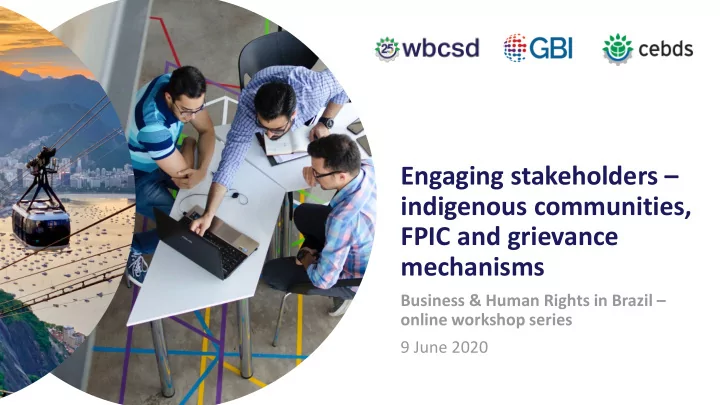

Engaging stakeholders – indigenous communities, FPIC and grievance mechanisms Business & Human Rights in Brazil – online workshop series 9 June 2020
Webinar logistics Chatham House rule Use the information you receive today, but do not affiliate the information with the identity of the speaker(s) or other participants. Webinar materials Following the webinar, we will share the slides and a summary of the webinar. Questions & Comments Use the chat feature to ask a question or comment. Mentimeter www.menti.com use the code 32 47 3
Welcome Catie Shavin Henrique Luz Davide Fiedler Director Technical Advisor, CEBDS Manager - Social Impact, WBCSD
Agenda 1) Welcome, orientation and introductions 2) Engaging stakeholders 3) Practical resources
Today’s speakers Simone Rocha Pinto Liesel Filgueiras Advisor, Latin America Human Rights and Sustainability Ghislayne Merino Luana Martins Andrade Principal Corporate Affairs - Community Human Rights Specialist
Welcome, orientation and introductions Click Davide Fiedler, WBCSD
Business & Human Rights in Brazil online workshop series 23 June 12 May 26 May 9 June Managing human rights What business needs to Training and capability Engaging stakeholders - risks in the supply chain know about the UN building - Talking to indigenous communities, Guiding Principles on colleagues about human FPIC and grievance Business and Human rights mechanisms Rights (UNGPs)
Today’s participants
Mentimeter On your device, type menti.com and then enter the code 32 47 3 32 47 3
Engaging stakeholders Click Catie Shavin, GBI
Topics 1 International human rights standards 2 Relevant legal frameworks in Brazil 3 Proposed new legislation
See takeaways The summary report of the webinar can be downloaded here
Resources Click Henrique Luz, CEBDS
Standards, policies and legislation ILO Convention 169 - Indigenous and Tribal Peoples Convention • ILO Convention 169 - Indigenous and Tribal Peoples Convention / Convenção n° 169 sobre povos indígenas e tribais • Brazilian enactment of ILO Convention 169 Decreto Nº 5.051, de 19 de Abril de 2004, later incorporated in Decreto Nº 10.088, de 5 de Novembro de 2019 (non regulated) • Protocolo de Consulta Prévia dos Povos Indígenas (Protocols of Prior Consultation of Indigenous Peoples) UN Declaration of the Rights of Indigenous Peoples UN Declaration on the Rights of Indigenous Peoples / Declaração das Nações Unidas sobre os Direitos dos Povos Indígenas IFC Performance Standards on Environmental and Social Sustainability Performance Standard 7: Indigenous Peoples Política Nacional de Desenvolvimento Sustentável dos Povos e Comunidades Tradicionais (National Policy for Sustainable Development of Traditional Peoples and Communities) Decreto Nº 6.040, de 7 de Fevreiro de 2007 Política Nacional de Gestão Territorial e Ambiental de Terras Indígenas (National Policy for Territorial and Environmental Management of Indigenous Lands) Decreto nº 7747, de 5 de Junho de 2012
Business examples O Setor Elétrico e o Meio Ambiente Fórum de meio ambiente do sector electrico ICMM Position Statement: Indigenous Peoples and Mining International Council on Mining and Metals (ICMM) Indigenous Peoples – Our Approach BHP BHP Indigenous Peoples Policy Statement BHP Indigenous Peoples and Traditional Communities / Povos Indígenas e Comunidades Tradicionais Vale Why Agreements Matter Rio Tinto Why Cultural Heritage Matters Rio Tinto
Practical guidance and insights Free, Prior and Contributions to the Engaging Debate on Improving Informed Consent Stakeholders FAO the Management of GBI Federal Environmental Licensing CEBDS (Portuguese) Engaging with Free, Guidelines on The Business Case For Prior and Informed Free, Prior and Protecting Land And Consent BSR Informed Consent Environmental UN-REDD Defenders And Indigenous Communities’ Rights Global Witness
Practical guidance and insights (cont) Handling and Community Effective Grievance resolving local-level grievance Mechanisms in the concerns and mechanisms in Banking Sector grievances ICMM the oil and gas Banktrack & Oxfam industry IPIECA Worth Listening – Investor Primer on Understanding and Grievance Mechanisms implementing human Ceres rights grievance management UN Global Compact Germany
Last date in this series For more information and to register, please follow the links under the respective dates. 23 June Managing human rights risks in the supply chain
Thank you Simone Rocha Pinto Liesel Filgueiras Advisor, Latin America Human Rights and Sustainability Ghislayne Merino Luana Martins Andrade Principal Corporate Affairs - Community Human Rights Specialist
Contact us Davide Fiedler Catie Shavin Henrique Luz Manager - Social Impact, WBCSD Director Technical Advisor, CEBDS fiedler@wbcsd.org catie.shavin@gbihr.org henrique.luz@cebds.org
obrigado fique seguro
Recommend
More recommend